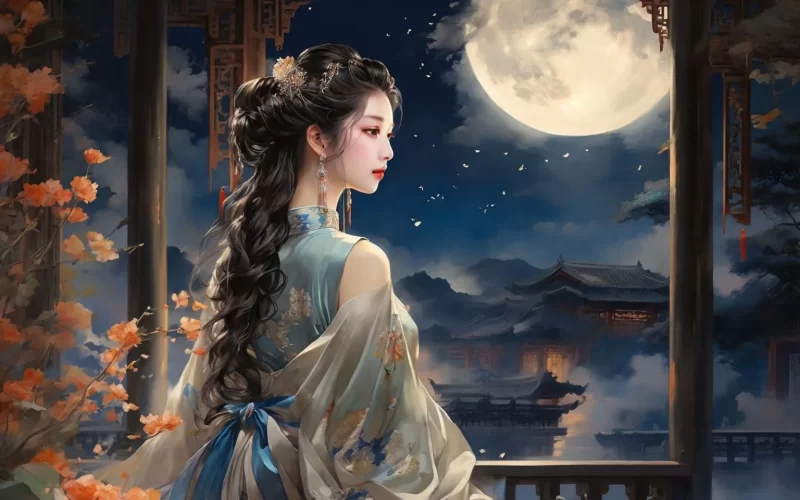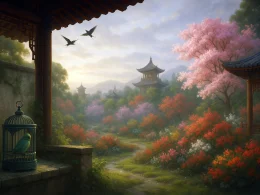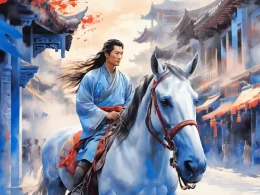The travellers' parting-song sounds in the dawn.
Last night a first frost came over the river;
And the crying of the wildgeese grieves my sad heart
Bounded by a gloom of cloudy mountains…
Here in the Gate City, day will flush cold
And washing-flails quicken by the gardens at twilight -
How long shall the capital content you,
Where the months and the years so vainly go by?
Original Poem
「送魏万之京」
李颀
朝闻游子唱骊歌, 昨夜微霜初度河。
鸿雁不堪愁里听, 云山况是客中过。
关城树色催寒近, 御苑砧声向晚多。
莫见长安行乐处, 空令岁月易蹉跎。
Interpretation
This poem was composed by Tang dynasty poet Li Qi (李颀 Lǐ Qí) to bid farewell to his friend Wei Wan (魏万 Wèi Wàn). Although Wei Wan was younger than Li Qi, their profound friendship resembled that of ageless companions. In his later years, Li Qi often resided in Yingyang and traveled frequently to Luoyang (洛阳 Luòyáng). This poem was likely written during one of these farewells in Luoyang. With heartfelt brushstrokes, the poet depicts the traveler's parting scene while conveying sincere concern and admonitions for his friend, creating genuinely moving emotions.
First Couplet: "朝闻游子唱骊歌,昨夜微霜初度河。"
Zhāo wén yóu zǐ chàng lí gē, zuó yè wēi shuāng chū dù hé.
At dawn I hear the wanderer singing farewell songs; Last night's light frost first crossed the river.
The poet establishes the time, place and atmosphere through the parting scene. The detail of "light frost" (微霜 wēi shuāng) adds an autumnal melancholy that intensifies the farewell sentiment.
Second Couplet: "鸿雁不堪愁里听,云山况是客中过。"
Hóng yàn bù kān chóu lǐ tīng, yún shān kuàng shì kè zhōng guò.
The wild geese's cries are unbearable amidst sorrow; Clouded mountains especially when traversed as travelers.
The migratory hóngyàn (鸿雁 wild geese) symbolize both seasonal change and parting grief, while the yúnshān (云山 clouded mountains) emphasize the journey's arduous distance, amplifying the traveler's hardships.
Third Couplet: "关城树色催寒近,御苑砧声向晚多。"
Guān chéng shù sè cuī hán jìn, yù yuàn zhēn shēng xiàng wǎn duō.
Frontier trees' colors hasten winter's approach; The imperial garden's pounding sounds multiply at dusk.
The poet uses natural imagery (trees turning color) and human activity (pounding laundry) to create a vivid late autumn atmosphere that mirrors the traveler's homesickness.
Fourth Couplet: "莫见长安行乐处,空令岁月易蹉跎。"
Mò jiàn Cháng'ān xíng lè chù, kōng lìng suì yuè yì cuō tuó.
Don't be dazzled by Chang'an's pleasure spots; Lest you vainly let years slip into wasted time.
The concluding admonition warns against indulging in the capital's pleasures (行乐处 xíng lè chù), urging instead the value of time and purposefulness, embodying worldly wisdom.
Overall Appreciation
This farewell poem combines deep emotion with profound meaning. The autumn imagery of wild geese, clouded mountains, frost and pounding clothes creates a melancholic atmosphere that intensifies the parting sentiment. The first six lines imaginatively depict the friend's difficult journey while expressing shared sympathy. The final couplet then shifts from emotion to reason, directly admonishing the friend to cherish time and avoid Chang'an's dissipations, showing the poet's deep concern. This fusion of parting sorrow, travel hardships and life philosophy adds thoughtful weight to the poem's emotional core.
Writing Characteristics
- Rich imagery creating atmosphere: Autumn elements like wild geese, clouded mountains, light frost and pounding sounds enhance the parting melancholy with strong visual and auditory effects.
- Blending reality and imagination: The poet combines actual scenes with envisioned journeys, making farewell emotions and travel hardships reflect each other.
- Progressive structure from scene to reason: The first six lines describe the environment and parting, while the last two shift to admonition, moving clearly from emotion to rationality.
- Concise language with profound meaning: Plain diction carries philosophical depth, expressing both parting feelings and life reflections for far-reaching artistic conception.
Insights
More than just a farewell poem, this work contains timeless wisdom. Through parting, the poet reflects on time's passage and earnestly warns against pleasure-seeking, urging instead the value of purposeful living. This philosophy transcends ancient contexts to modern relevance. Life's journey often distracts us with immediate pleasures, but true importance lies in valuing time, enriching ourselves and avoiding empty years - a lesson as vital today as in Tang dynasty Chang'an.
About the Poet

Li Qi (c. 690 - 753 AD) . A renowned Tang dynasty poet, Li Qi traced his ancestral roots to Zhao Commandery (present-day Zhao County, Hebei) but resided primarily in Yingyang (modern Dengfeng, Henan). Li Qi excelled in five- and seven-character verse forms, particularly frontier poems and musical poetry. He maintained close friendships with literary giants like Wang Wei, Gao Shi, and Wang Changling, later being grouped with them as one of the "Four Masters of High Tang" (Gao, Cen, Wang, and Li).












